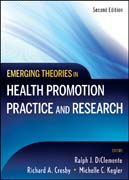
Emerging theories in health promotion practice and research
Diclemente, Ralph J.
Crosby, Richard A.
Kegler, Michelle C.
Adolescents (a high-risk health group) are growing as a percentage of the populations. This text offers an action-oriented epidemiologic approach to understanding the risk factors affecting adolescent health, and what can be done in response. Drawing on the leading experts in the field, this reference provides a survey and assessment of adolescent health risk behaviors, such as smoking, violence, teen pregnancy, and AIDS. Also described are trends and changes in risk behaviors over time; important theoretical models for developing interventions; prevention strategies for each risk behavior; and effective treatmentmodalities. INDICE: Tables and Figures. Foreword. Acknowledgements. The Editors. The Contributors. Introduction. 1 Theory in health Promotion Practice and Research (Richard A. Crosby, Michelle C. Kegler, Ralph J. DiClemente). Part 1 Individual-level Approaches. 2 The Information-Motivation-Behavioral Skills Model of HIV Preventive Behavior (Jeffrey D. Fisher, William A. Fisher, Paul A. Shuper). 3 Social Influences: The Effects of Socialization, Selection, and Social Normative Processes on Health Behavior (Bruce G. Simons-Morton, Denise Haynie, Elizabeth Noelcke). 4 Self-esteem Enhancement Theory: Promoting Health across the Life-Span (David L. DuBois, Brian R. Flay, Michael C. Fagen). 5 Conservation of Resources Theory: Application to Public Health Promotion (Stevan E. Hobfoll,Jeremiah A. Schumm). 6 Self-Determination Theory: Process Models for Health Behavior Change (Michelle S. Fortier, Geoffrey C. Williams Shane N. Sweet, Heather Patrick). 7 The Elaboration Likelihood Model of Persuasion: Developing Health Promotions for Sustained Behavioral Change (Richard E. Petty, Jamie Barden, S. Christian Wheeler). 8 An Integrative Model for Behavioral Prediction and its Application to Health Promotion (Martin Fishbein). Part 2 Community-Based Approaches. 9 The Community Coalition Action Theory (Frances D. Butterfoss andMichelle C. Kegler). 10 Community Capacity: Theory and Application (Monica L.Wendel, James N. Burdine, Kenneth R. McLeroy, Angela Alaniz, Barbara L. Norton, Michael R.J. Felix). 11 Natural Helper Models to Enhance a Community's Health and Competence (Eugenia Eng, Scott D. Rhodes, Edith Parker). 12 Community-Based Prevention Marketing: A Hybrid Framework for Public Health Professionals (Carol A. Bryant, Kelli R. McCormack Brown, Rita D. Debate, Moya L. Alfonso, Julie A. Baldwin, Paul Monaghan, Leah M. Phillips). Part 3 Ecological Approaches. 13 Changing Our Unhealthy Ways: Emerging Perspectives from Social Action Theory (Craig K. Ewart). 14 The Theory of Gender and Power: Constructs, Variables, and Implications for Developing HIV Interventions for Women (Gina M. Wingood, Christian Camp, Kristin Dunkle, Hannah Cooper, Ralph J. DiClemente). 15 TheLogical and Empirical Basis for the Behavioral Ecological Model (Mel Hovell, Dennis Wahlgren, Marc Adams). 16 The Theory of Triadic Influence (Brian R. Flay, Frank Snyder, John Petraitis). 17 The Interactive Domain Model Approach to Best Practices in Health Promotion (Barbara Kahan, David Groulx, Josephine Pui-Hing Wong). 18 COMBI - Communication-for-Behavioral-Impact: A WHO Approach toSocial Mobilization in the Promotion of Health (Everold Hosein, Will Parks, Renata Schiavo). 19 Issues and Challenges in Applying Theory to Health Promotion Practice and Research (Ralph J. DiClemente, Michelle C. Kegler, Richard A. Crosby). References. Index.
- ISBN: 978-0-470-17913-0
- Editorial: John Wiley & Sons
- Encuadernacion: Cartoné
- Páginas: 624
- Fecha Publicación: 01/12/2009
- Nº Volúmenes: 1
- Idioma: Inglés
